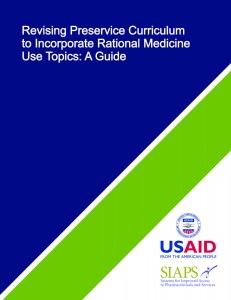Preservice curriculum reform is a cost-effective and sustainable intervention that leads to broader health system strengthening. It provides students with a critical foundation of knowledge and skills and develops their competency to practice in the real world. Effective preservice training reduces the need for future large-scale and expensive in-service trainings.
Based on SIAPS’ and its predecessor’s – the USAID-funded SPS Program – experiences in assisting curriculum reform in resource-constrained settings, SIAPS has developed a document on Revising Preservice Curriculum to Incorporate Rational Medicine Use Topics: A Guide.
The objectives of this guidance document are to—
- Promote topics related to rational medicine use (RMU) — including antimicrobial resistance (AMR) and pharmacovigilance — as urgent global health issues that need to be adequately reflected in preservice training curricula across health care disciplines, particularly medicine, pharmacy, nursing, and public health.
- Enable preservice health care training institutions to assess their current curriculum and identify gaps in RMU-related content.
- Equip stakeholders at training institutions with the knowledge and tools necessary to successfully incorporate RMU-related content changes to the preservice training curriculums.
The document describes a step-wise process to add RMU components to preservice training curricula and includes several tools and templates. It also provides actual examples of curriculum reforms carried out in resource-constrained settings to include RMU, AMR and pharmacovigilance topics.
Click here to download the document [PDF-935KB].


